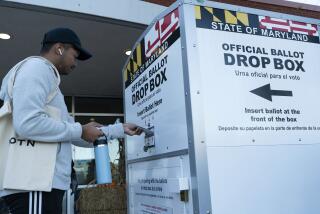Momentum slows for voting rights bills as Sinema, Manchin reject filibuster change

Democrats’ strategy to ignite a Senate debate on voting rights begins to wane after Sens. Sinema and Manchin reiterate opposition to changing filibuster rule.
- Share via
WASHINGTON — Democrats’ strategy to begin a Senate debate on voting rights began to crumble Thursday when two key moderates reiterated their support for keeping the filibuster, another Democrat quarantined with COVID-19 and President Biden expressed doubt that landmark legislation would land on his desk anytime soon.
A day that began with momentum for Senate Democrats soon devolved into another day of disappointment as the chamber barreled toward a self-imposed Jan. 17 deadline to pass two measures — the Freedom to Vote Act and the John R. Lewis Voting Rights Advancement Act — even if that meant they’d have to change long-standing filibuster rules to do so.
But by the end of the day, it appeared Democrats lacked the votes to accomplish either.
Ahead of a Biden visit to Capitol Hill to rally Democrats, centrist Sen. Kyrsten Sinema (D-Ariz.) reiterated her longstanding support for the 60-vote threshold to pass legislation and her opposition to Democrats’ efforts to weaken it.
“While I continue to support these [voting rights] bills,” Sinema said in a 20-minute floor speech, “I will not support separate actions that would worsen the underlying disease of division infecting our country.”
Senate Minority Leader Mitch McConnell (R-Ky.), who has led Republican opposition to the bills and to efforts to abandon the filibuster, said Sinema “saved the Senate as an institution.”
Biden left the meeting with Democrats unconvinced that he had swayed Sinema and Sen. Joe Manchin III (D-W.Va.), another key moderate.
“I hope we get this done, but I’m not sure,” Biden told reporters. “I don’t know that we can get it done, but I know one thing: As long as I have breath in me, as long as I’m in the White House, as long as I’m engaged at all, I’m going to be fighting.”
Later Thursday, Manchin issued a statement reiterating his opposition to eliminating or weakening the filibuster.
Also complicating the timetable was news Thursday that Sen. Brian Schatz (D-Hawaii) was quarantining after he tested positive for COVID-19, despite being vaccinated and boosted. It was unclear how that might impact the voting schedule.
Senate Majority Leader Charles E. Schumer (D-N.Y.) had outlined the details of a plan in a memo to Senate Democrats on Wednesday in which the House would transmit a measure to the Senate in a way that allows the chamber to begin debate with a simple majority of members present, instead of the usual 60-vote threshold.
The House on Thursday approved the measure, 220 to 203, putting the Senate on track to debate voting rights for the first time this Congress.
While the House has passed versions of both bills twice before, Republicans have repeatedly used the filibuster over the past year to block them. Schumer has suggested he will bring the measure to a vote, regardless of the obstacles.
“Over the next few days, the United States Senate will face a critical and unavoidable question,” Schumer said on the Senate floor. “Are its members going act to protect our democracy and protect voting rights, or will its members choose the path of obstruction, inaction and side with the big lie overtaking our precious experiment in self-rule?”
Democrats say the voting rights reforms are needed to combat restrictive local laws that have been erected in several GOP-led states over the past year. They say the problem is so serious that it merits making an exception to the filibuster rule, a point they’ve pressed unsuccessfully with Sinema and Manchin.
“She believes that the risk of changing the filibuster is greater than the risk of what’s going on in the states,” Sen. Angus King (I-Maine) said of Sinema. “I hope profoundly that she’s right. I fear that she’s wrong.”
President Obama on Thursday urged the Senate in a USA Today editorial “to do the right thing.”
And a quartet of House Democratic leaders sought to put additional pressure on their Senate colleagues to support a filibuster carveout to allow Congress to enact new laws to counteract what Democrats have said is a coordinated effort among Republican-led state legislatures to suppress the votes of people of color, young people, the elderly and people with disabilities.
“The reality is our democracy doesn’t survive without this,” Rep. Pramila Jayapal (D-Wash.), chair of the Congressional Progressive Caucus, told reporters.
“It is really important that we do everything we can to have the debate because it hasn’t even been debated,” Jayapal said. “Republicans haven’t been forced into a conversation about why they would be opposing voting rights at this critical juncture.”
In his floor remarks, McConnell said, “Nobody in this country is buying the fake hysteria that democracy will die.” He cited polling that he said shows voters are significantly more concerned about other issues.
“There’s a path forward for my Democratic colleagues to respond to the country they have so badly disappointed, but it isn’t to try to break the Senate and rewrite election laws,” McConnell added. “It’s to actually start tackling the issues that American families need tackled.”
Though Democrats acknowledge they may lack the votes to pass the bills or change the rules, Sen. Raphael Warnock (D-Ga.) said in an interview that holding a vote was critical.
“We have to vote because that’s what senators are here to do: to vote,” said Warnock, who is up for reelection this year. “This is a moral moment, and the question of this moment is: Where do you stand on voting rights? Do you think that Senate procedures, which have changed over time, are more important than people’s ability to have a voice in their own democracy? Everybody needs to be heard on that — Democrats and Republicans.”
Republicans have also warned that Democrats will come to regret any rules change because power in the Senate will inevitably shift. In an interview, Sen. Christopher S. Murphy (D-Conn.) argued that it’s worth the risk.
“Democracy is democracy. You win sometimes and you lose sometimes,” he said. “It’s already hard enough to enact significant policy change.”
He added that, Republican or Democrat, parties with a government trifecta should be able to enact their agenda.
“Remember,” he continued, “just because you have majorities doesn’t make it easy to enact your agenda. Look how hard it is to pass Build Back Better. Look how hard it was for Republicans to repeal the Affordable Care Act.”
More to Read
Get the L.A. Times Politics newsletter
Deeply reported insights into legislation, politics and policy from Sacramento, Washington and beyond. In your inbox twice per week.
You may occasionally receive promotional content from the Los Angeles Times.











